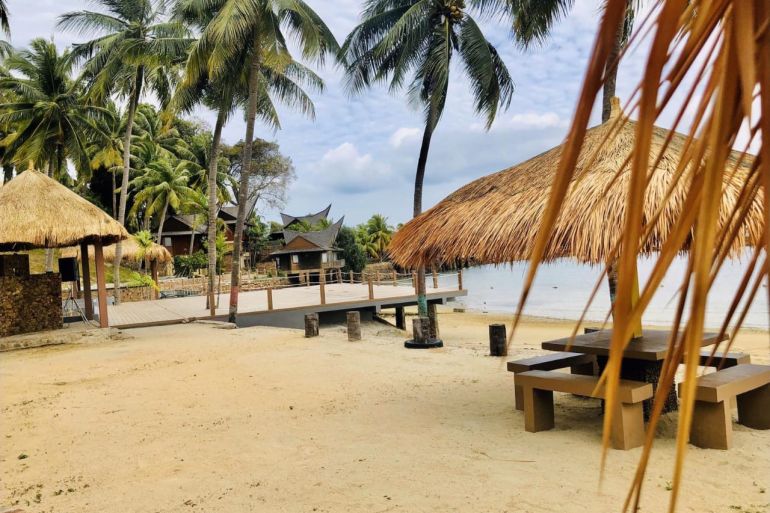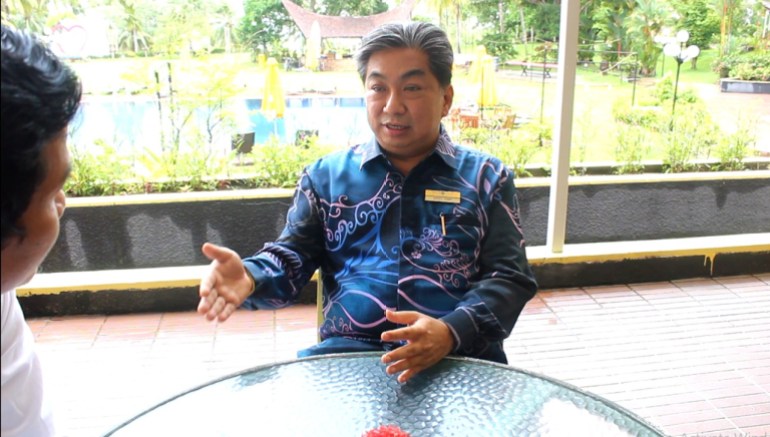Indonesian islands bank on Singapore bubble for tourism revival
Batam and Bintan are hoping travel bubble will bring back visitors after collapse of tourism during the pandemic.

Ubud, Bali – Before the pandemic, Carol Pou, a corporate trainer in Singapore, would visit the Indonesian island of Batam several times a month.
So when plans for a travel bubble between Singapore and the neighbouring islands of Batam and Bintan were announced last month, Pou was inundated with messages from friends and relatives about the news.
Keep reading
list of 4 itemsTrudeau invokes emergency powers in response to trucker protests
US judge to dismiss Sarah Palin’s lawsuit against New York Times
US: Tough border rhetoric dominates in lead-up to Texas election
“They all know how excited I was going to be about it,” Pou told Al Jazeera. “The first thing I did was message the resort. ‘When can I go?’ I told them. If I could travel to Batam tonight, I would.”
After weeks of uncertainty over when the scheme would begin, Pou will get her chance starting February 18, after Singaporean authorities this week granted long-awaited approval for ferries from Batam.
Batam and Bintan, part of Indonesia’s Riau Archipelago, are hugely popular among tourists from nearby Singapore. Before the arrival of COVID-19, residents of the city-state could take a 45-minute ferry ride for a weekend getaway at one of the islands’ countless beach resorts or golf courses.
When the pandemic hit, tourism collapsed.
Batam and Bintan’s tourist numbers have plunged more than 90 percent during the pandemic, according to the Riau Islands Central Statistics Bureau. In 2019, the islands ranked second after Bali as Indonesia’s most-visited destination for foreign tourists, with more than 2.5 million international visitors. Of those, 1.9 million went to Batam, with most hailing from neighbouring Singapore and Malaysia.
‘Catastrophic’
“We used to welcome an average of 150,000 international visitors every month,” Edy Sutrisno, director of the Batam Tourism and Promotion Board, told Al Jazeera. “But from March 2019 until recently, it’s less than 200 visitors monthly. Imagine how devastating it is to the tourism industry on the island. It’s catastrophic.”
But now, with the recently announced travel bubble on the horizon, Sutrisno feels some sense of hope.
“It’s a breath of fresh air in the midst of our struggle,” Sutrisno said. “Currently, the bubble is still tied exclusively to the Nongsa area in Batam and Lagoi in Bintan, but the rest are looking forward to it. We are eager to start.”
The Indonesian government announced the travel bubble on January 24. For weeks, however, no ferry from Batam or Bintan has been allowed to cross over to Singapore. On Monday, the Singaporean government issued entry approval for ferries from Batam starting on February 18. No permit has so far been issued for ferries from Bintan.
With sea crossings restricted, the islands have yet to see any bounce in international arrivals.
Charmane Sia, an assistant manager at WTS Travel, one of Singapore’s biggest travel agencies, said the fact the agreement is not yet reciprocal serves as a major hurdle for holidaymakers.
“There is definitely a spike in customer inquiries for travel to Batam and Bintan, but the take-up rate for the travel corridor scheme is low,” Sia told Al Jazeera.
“To date, Singaporean travellers returning from the two holiday islands must still serve a seven-day stay-home notice as Singapore has yet to reciprocate Indonesia’s move to open up for quarantine-free travel by sea.”

Last November, Singapore announced a unilateral vaccinated travel lane (VTL) with Indonesia for travellers flying from Jakarta to Changi Airport. The VTL scheme allows fully-vaccinated individuals to enter Singapore without undergoing 7 days of home quarantine, but is not open to sea travel.
Pou, the corporate trainer, said she would not mind doing home quarantine so long as she could travel to one of her favourite destinations.
“At the moment, I’m willing to follow any regulation as I just can’t wait to go back. But definitely for many, the fact that we have to do PCR many times will deter them from coming,” Pou said, referring to the requirement for visitors to take three COVID-19 tests. “The cost for the PCR is 150 Singaporean dollars ($111) here.”
“Most of the time, I only go there for a weekend getaway. So if I have to do multiple PCRs, this will mean that I will not be able to go as often as I used to.”
Pou said the travel bubble might have a greater chance of success if authorities accepted the cheaper Antigen Rapid Test (ART).
“Like the Malaysian Langkawi travel bubble that’s already running,” she said. “Most of us in Singapore are already fully vaccinated, including the booster, anyway.”
Currently, Indonesia requires visitors to be double vaccinated and to have stayed in Singapore for at least 14 days before their arrival. They must also produce a negative PCR test result within 72 hours of departing Singapore and upon arrival in Indonesia.
Visitors must also have insurance with minimum coverage of 30,000 Singaporean dollars ($22,263) and use the government’s COVID-19 tracing apps.
‘Has to be successful’
Travellers may only stay at resorts in the Nongsa Sensation and Lagoi areas in Batam and Bintan, respectively. There are five available beach resorts in Nongsa and 15 in Lagoi. So far, no bookings have been taken at either destination.
Still, stakeholders are hopeful.
Anddy Fong, general manager of Batam View Beach Resort, one of the resorts offering travel packages, told Al Jazeera preparations had been a long time in the making.
“We have spent the last two years getting ready. We have a 100 percent vaccination rate in the Nongsa Sensation area,” Fong said. “All of our 2000 employees are twice vaccinated and have received the booster.”
Fong said the island offered visitors everything from beautiful beaches and golf courses, to water sports and seaside restaurants.
“Some people might feel that the travel bubble regulations are too much for a simple weekend getaway, but they can also spend a working holiday here. The travel bubble allows travellers to stay up to 14 days. We have an internet connection. Why wouldn’t you want to work by the beach?” he said.
“We’re the pilot, and once this is successful, other tourism destinations in Indonesia might be next. So it has to be successful. It needs to be.”